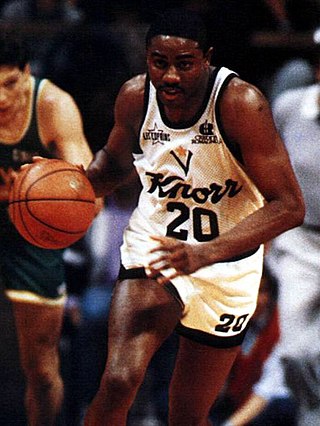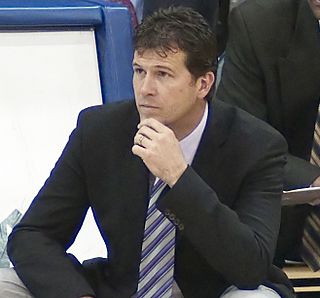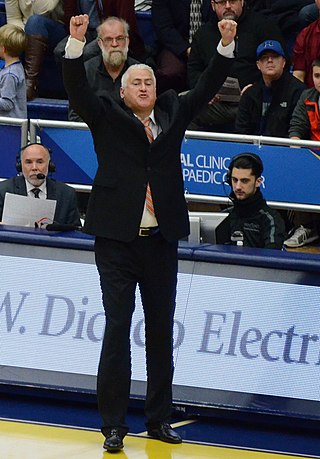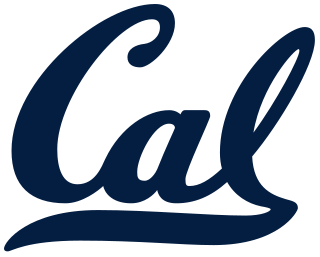
Micheal "Sugar" Ray Richardson is an American former professional basketball player and head coach. He played college basketball for the Montana Grizzlies. The No. 4 overall pick in the 1978 NBA draft, Richardson played in the National Basketball Association (NBA) for eight years with the New York Knicks, Golden State Warriors and New Jersey Nets. He was a four-time NBA All-Star, and led the league in steals in three seasons. He later became a head coach in the Continental Basketball Association (CBA) and National Basketball League of Canada.

Michael John Montgomery is a retired American basketball coach. He is best known for his 18-year tenure at Stanford (1986–2004), where he led the program to 12 NCAA Tournaments, including a Final Four appearance in 1998. Montgomery previously served as head coach at the Montana (1978–1986). Following his time at Stanford, he coached the Golden State Warriors of the National Basketball Association (NBA) for two seasons (2004–2006) before ending his career at the University of California (2008–2014). He announced his retirement from coaching following the 2013–14 season.

Stephen Todd Alford is an American men's college basketball coach and former professional player who is the head coach for the Nevada Wolf Pack of the Mountain West Conference (MWC). Born and raised in Indiana, he was a two-time consensus first-team All-American playing in college for the Indiana Hoosiers. He led them to a national championship in 1987. After playing professionally for four years in the National Basketball Association (NBA), he has been a college head coach for over 30 years.

Mahdi Abdul-Rahman was an American professional basketball player and college basketball coach. He played in college for the UCLA Bruins and was a member of their first national championship team in 1964. He also won a gold medal that year with the US national team at the 1964 Summer Olympics. Hazzard began his pro career in the National Basketball Association (NBA) with the Los Angeles Lakers, who selected him a territorial pick in the 1964 NBA draft. He was named an NBA All-Star with the Seattle SuperSonics in 1968. After his playing career ended, he was the head coach at UCLA during the 1980s.

Lucius Oliver Allen, Jr. is an American former professional basketball player. He is one of only a select few players to have won at least one high school state championship, collegiate national championship, and NBA championship.

William Quinn Buckner is an American former professional basketball player and coach. He played collegiate basketball for the Indiana University Hoosiers, and won a national championship in 1976. He was a captain of both the last undefeated NCAA Division I basketball champion and the 1976 Olympics gold medal team. Buckner was selected by the Milwaukee Bucks with the 7th pick of the 1976 NBA draft. He had a ten-year NBA career for three teams. In 1984, he won an NBA title with the Celtics.

Bobby Gene Bartow was an American men's college basketball coach. The Browning, Missouri, native coached 36 years at six universities after coaching two high schools in Missouri for six years. In 1972 Bartow coached the Puerto Rico national basketball team in the 1972 Munich Olympic Games.
George Melvin "Jud" Heathcote was an American basketball player and coach. He was a college basketball head coach for 24 seasons: five at the University of Montana (1971–1976) and nineteen at Michigan State University (1976–1995). Heathcote coached Magic Johnson during his two years at Michigan State, concluding with the 1979 national championship season. He also coached the University of Montana to a national handball championship in 1974.

The Montana Grizzlies and Lady Griz are the nicknames given to the athletic teams of the University of Montana, located in Missoula. The university is a member of the Big Sky Conference and competes in NCAA Division I, fielding six men's teams and nine women's teams. The football team has won the university's only two NCAA championships.

Larry Brett Krystkowiak is a retired American professional basketball player, and former head coach of the Utah Utes men's basketball team.
Donald Lloyd Monson is a former college basketball head coach and the father of head coach Dan Monson. He was a high school head coach for 18 seasons and college head coach for 14 seasons: five at Idaho and nine at Oregon. He was selected by his peers as the national coach of the year in 1982. Monson spent 1993 in Australia, coaching the Adelaide 36ers of the National Basketball League.

The UCLA Bruins men's basketball program represents the University of California, Los Angeles in the sport of men's basketball as a member of the Big Ten Conference. Established in 1919, the program has won a record 11 NCAA titles. Coach John Wooden led the Bruins to 10 national titles in 12 seasons, from 1964 to 1975, including seven straight from 1967 to 1973. UCLA went undefeated a record four times. Coach Jim Harrick led the team to another NCAA title in 1995. Former coach Ben Howland led UCLA to three consecutive Final Four appearances from 2006 to 2008. As a member of the AAWU, Pacific-8 and then Pacific-10, UCLA set an NCAA Division I record with 13 consecutive regular season conference titles between 1967 and 1979 which stood until tied by Kansas in 2017. In 2024, UCLA departed the Pac-12 Conference and joined the Big Ten Conference on August 2, 2024.
The Memphis Tigers men's basketball team represents the University of Memphis in NCAA Division I men's college basketball. The Tigers have competed in the American Athletic Conference since 2013. As of 2020, the Tigers had the 26th highest winning percentage in NCAA history. While the Tigers have an on-campus arena, Elma Roane Fieldhouse, the team has played home games off campus since the mid-1960s. The Tigers moved to the Mid-South Coliseum at the Memphis Fairgrounds in 1966, and then to downtown Memphis at The Pyramid, initially built for the team in 1991 and later home to the NBA's Memphis Grizzlies. In 2004, both teams moved to a new downtown venue, FedExForum. ESPN Stats and Information Department ranked Memphis as the 19th most successful basketball program from 1962 to 2012 in their annual 50 in 50 list.

Wayne Francis Tinkle II is an American college basketball coach who is the head coach of the Oregon State Beavers men's team of the West Coast Conference. Prior to his arrival in Corvallis in 2014, he was the head coach for eight seasons in the Big Sky Conference at his alma mater, Montana, preceded by five years with the Griz as an assistant coach.

The California Golden Bears men's basketball team is the college basketball team of the University of California, Berkeley. The program has seen success throughout the years, culminating in a national championship in 1959 under coach Pete Newell, and the team has reached the final four two other times, in 1946 and 1960.

Pete Trgovich is an American former college basketball player. He played for the UCLA Bruins, and won two national championships during his career.

Jordan LaVell Adams is an American professional basketball player who last played for San Miguel Beermen of the Philippine Basketball Association (PBA). He played college basketball for the UCLA Bruins. He was the first UCLA freshman to score 20 or more points in his first four games, and was an all-conference first-team selection in the Pac-12 Conference in his sophomore year. After deciding to forgo his remaining college eligibility and enter the 2014 NBA draft, Adams was selected by Memphis Grizzlies in the first round with the 22nd overall pick. He played two seasons with Memphis before being waived after multiple knee surgeries.

The 2017–18 Montana Grizzlies basketball team represented the University of Montana during the 2017–18 NCAA Division I men's basketball season. The Grizzlies, led by fourth-year head coach Travis DeCuire, played their home games at Dahlberg Arena in Missoula, Montana as members of the Big Sky Conference. They finished the season 26–8, 16–2 in Big Sky play to win the Big Sky regular season championship. They defeated North Dakota, Northern Colorado, and Eastern Washington to be champions of the Big Sky tournament. They earned the Big Sky's automatic bid to the NCAA tournament where they lost in the first round to Michigan.

The 1974–75 Montana Grizzlies basketball team represented the University of Montana during the 1974–75 NCAA Division I basketball season. Charter members of the Big Sky Conference, the Grizzlies were led by fourth-year head coach Jud Heathcote and played their home games on campus at Adams Fieldhouse in Missoula, Montana.

The 1973–74 Montana Grizzlies basketball team represented the University of Montana during the 1973–74 NCAA Division I men's basketball season. Charter members of the Big Sky Conference, the Grizzlies were led by third-year head coach Jud Heathcote and played their home games on campus at Dahlberg Arena in Missoula, Montana. They finished the regular season at 19–7, with a 11–3 conference record, tied for the regular season title with Idaho State; the Bengals won the one-game playoff in Missoula by three points.














